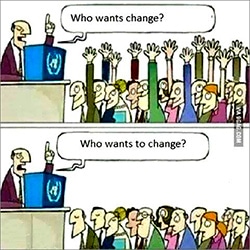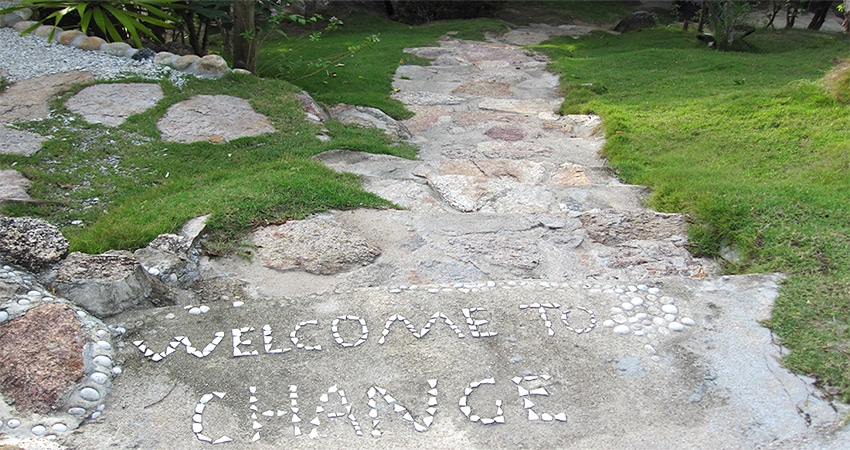“Do people change?”
A lot of people ask this question. It’s a question that most everyone can relate to, though sadly, the general consensus seems to be that people don’t change. This is not true. We usually ask this when there is someone in our environment we wish would behave in a better way, so that our relationship with them could improve, but we seem to expect that they should change without us having to do anything ourselves. However, it takes two people to create a relationship dynamic, so the thinking should be, “if I want the other to change, I will have to make some changes too”. This then leads to the following question.
“Can I change?”
 People tend to think that because they have lived for so long in a particular way, it’s impossible to change. People can change and they do; if they want to and if they see the benefit in doing so. The people that come to ask this question are usually already invested in changing for the better. They just don’t know how to do it. This can bring them to psychotherapy.
People tend to think that because they have lived for so long in a particular way, it’s impossible to change. People can change and they do; if they want to and if they see the benefit in doing so. The people that come to ask this question are usually already invested in changing for the better. They just don’t know how to do it. This can bring them to psychotherapy.
With psychotherapy you begin to clearly see various patterns in your perceptions, feelings and behavior, to understand their origins, and why and how they are affecting your life in the present. It is this very understanding that is the start of the change. Acquiring this understanding means that you have the ability to change the things you now understand. So the question then becomes how.
How does one change?
Psychotherapy can help greatly. It’s true however, that whether through online psychotherapy or face-to-face work, therapy does not provide a cure, like a course of antibiotics does. What it can do is help you significantly to make great progress in building your life to a level where you will be more satisfied, more aware of what goes on inside of you and more capable of understanding others in the process, which will help you to feel safer and more confident around other people and therefore, more able to enjoy your relationships both to yourself and to others.
Here’s the theory behind it
When you are born into the family or care takers that raise you, and from that point onward, particularly in the early years of your life, you slowly develop a model of perceiving and interpreting the wealth of stimuli that come your way, with their resulting experienced emotions. During this upbringing, certain types of psychological developmental trauma may occur, which, along with the good experiences you’ve had, create this model. Let’s call this the primary model.
Some examples of traumatic experiences of various degrees are: my brother is my mother’s favorite child, he’s getting more attention than me and she’s always comparing me to him and how well he’s doing; my father drinks and then hits me and belittles me, I must deserve it, but it feels so unfair; I’m hungry and mom has not cooked a meal for me; my friends give me the cold shoulder and criticise me; my father locks me up in the dark, moist and scary basement when I do something wrong; I always seem to be in the wrong; I’m always doing chores and never get to play like my friends do at home; my parents don’t sit and talk with me, they only tell me what to do. They don’t really care; the examples are endless. Children experience lesser or greater levels of  missattunement and neglect, and emotional, verbal or physical abuse. Either it is done to them or they are witness to it in their own homes.
missattunement and neglect, and emotional, verbal or physical abuse. Either it is done to them or they are witness to it in their own homes.
These experiences leave their mark forever and go to shape the model through which the child, and later adult, interprets and understands the world they live in, which in turn affects their behavior. There may be a single extremely traumatic event, or many not so severe events that have a cumulative effect, which may be just as, or more, detrimental than a single event.
Based on these experiences and depending on the degree and amount of developmental traumas that you may have experienced so far, various emotions will be activated. These may be extreme in intensity and you may be unable to manage them, or they may be less intense and more manageable. The bigger the intensity, the more difficult it can be.
When you reach adulthood, this model has been established in your mind as a way of operating in the world. The bad news is that it cannot be erased. The good news is that with psychotherapy you can learn to create a new model, one that will operate on top of your primary model. Through learning to become aware of how you are interpreting the world, you become more able to provide new interpretations. What was once an automatic reaction, without thought, as automatic as a knee-jerk reaction, can now become an object of focus and examination, a conscious process, which can lead to different ways of understanding, feeling and behaving. Through this process, you slowly build a new model, through which the very same stimuli can be perceived and interpreted in a different way, so that they lead to different, more manageable emotions and thought processes, and ultimately to a different, more creative way of responding to one’s self, the internal world and others.
When a particularly stressful event takes place, the primary model will always kick in. With time, effort and practice, the new model will quickly be activated and take over. Depending on the intensity of the stressful event and with increasing awareness and ability to tolerate and process the resulting thoughts and feelings, it will gradually become easier as you go along.
This then constitutes change, and it can be very visible to the people around you.
Bibliography:
Paul Renn (2012). The Silent Past and the Invisible Present: Memory, Trauma and Representation in Psychotherapy. New York: Routledge.

